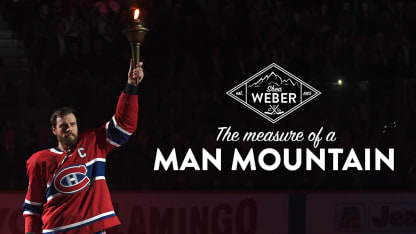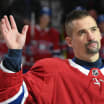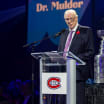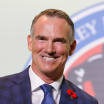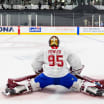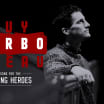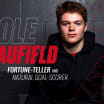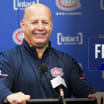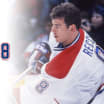It may seem impossible to believe now, but Shea Weber was overlooked at a couple of key points in his hockey career.
The first time was when Weber went unclaimed in the Western Hockey League draft, perhaps partly because he was still morphing from a 5-foot-10 teenager to the 6-foot-3 "Man Mountain" he would become, and maybe also because he had only committed to playing defense full-time in his second year of Bantam.
Either way, none of that stopped Weber from helping the Kelowna Rockets to a pair of WHL titles and one Memorial Cup championship in three appearances from 2003-2005.
The second time was in his NHL Draft year, when Weber saw 13 defensemen get their names called before the Nashville Predators took him with the 49th overall pick in the second round in 2003.
Looking back at that Draft several years later, Nashville's former assistant general manager, Paul Fenton, told Vancouver's The Province that the Preds were trying to shore up the defensive position that year and that their strategy was to stockpile rearguards in the hopes some of them would pan out. The fact that Weber turned out to be an elite player, he said, might have been the result of a bit of luck.
Not all were of the same mindset back then, however; Barry Trotz, Weber's longtime former coach in Nashville, remembers it differently, for one.
"You build good teams with good defensemen and quality people," described Trotz, Weber's bench boss from 2005-06 to 2013-14. "[The Predators] were looking for a couple of things: they were looking for people with really good character, they were looking for some size, and they were looking for people who came from winning organizations."
Trotz recalled that although Nashville's scouting staff was high on fellow blue-liner Ryan Suter - whom the Preds plucked with the seventh-overall pick that same year - that doesn't mean they didn't know what they were getting in Weber.
"We had some really good connections with that Kelowna team. I'm from out there, but our scouts were really locked into the Kelowna people," he shared. "Every year when you draft, you try to identify people with great character and certain skill sets.
"Shea came as advertised."
Some of that 'advertisement' came from the Rockets' owner, Bruce Hamilton, who rightfully predicted that Weber would one day have the C sewn on his sweater.
Hamilton told his friend Trotz that the Predators would "love" Weber, and it didn't take long for the people in Nashville to see why.
"When he came to camp, you knew right away. He just carried himself like a man. Even though he was just a young man at the time, he carried himself more maturely," recounted Trotz. "He was very respectful, he was diligent, all the things you see as captain of the Montreal Canadiens... we saw it right away. We knew at some point he would be leading the Nashville Predators: all those things that you get to see that the young people in Montreal, that the young people in Nashville had the opportunity to look up to, and have a great leader like he is."
After being drafted, Weber went on to capture the Memorial Cup with the Rockets in 2004 and followed that up with World Junior gold for Canada in 2005.
Limited to just 28 games in his rookie NHL season in 2005-06, he followed that up with a 17-goal, 40-point sophomore campaign.
By the time he became the first Nashville draft pick to be named captain of the Predators in 2010, he already had three 15-goal seasons under his belt - and that was in just five years in the NHL.
Known for his blistering slapshot, Weber honed the skill over many hours spent blasting away in his back yard in Sicamous, BC with scraps his dad, James, would bring home from the sawmill where he worked. In Shea's case, practice certainly made perfect - he once tore a hole through the net with his shot in a game against Germany at the 2010 Winter Olympics in Vancouver, and has won the NHL's Hardest Shot competition four times in seven appearances at the All-Star Game - but the shot is just one part of a complete toolkit that has made him a dream to coach.
"He's known for the shot, but he's a lot more skilled and has a lot more finesse than you think. When he's on the ice, there's lots of noise," described Trotz of Weber, who won gold with Canada in 2010 and again at the 2014 Games in Sochi. "It's usually someone against the boards or in front of the net, or that shot coming from the point. He's got a really good skill set and a great demeanor for any organization, especially as a leader.
"You can't have success as a group without good leadership. Shea was a guy that I could go to, I could ask him, 'What do you think?' and he'd be very honest. Or he would say, 'I've got this, you leave this with me, I'll take care of it.' That's the great thing about Shea: he's been a winner all his life. He's won in Kelowna, he's won at the American League level, the World Juniors, Olympic golds... he sees success. He's a big part of success, and he gets it. There's a process of having to do certain things to learn how to win, and he's been able to do it on every level."
After 11 seasons in Nashville, Weber was dealt to Montreal in the unforgettable trade for P.K. Subban, and was named 30th captain of the Canadiens right before the start of his third season in the mecca of hockey.

